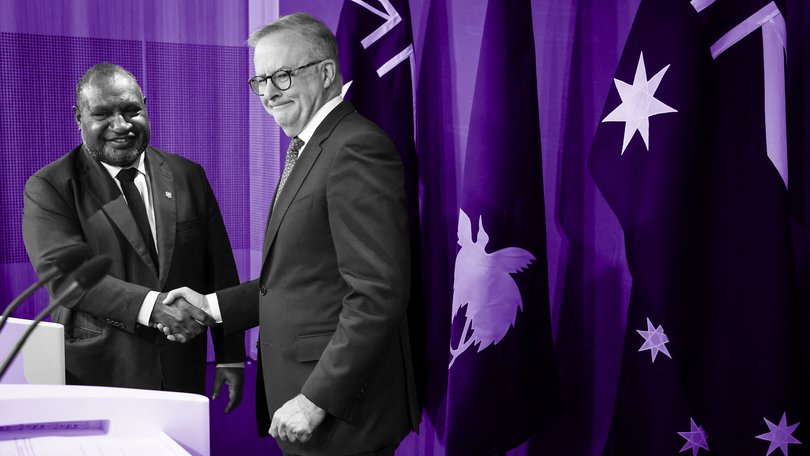MIHAI SORA: Australia and PNG treaty failure is a symptom of the Pacific’s ongoing diplomatic knife fight
MIHAI SORA: Derailing the treaty at the last moment was designed to inflict maximum damage on Marape’s domestic credibility. And it doesn’t look great for Albanese either.

Papua New Guinea and Australia didn’t sign a long anticipated Mutual Defence Treaty on Wednesday.
Instead, the prime ministers from both countries issued a last-minute communique, stating that the text had been agreed and the Treaty would be signed, “following Cabinet processes in both countries”.
Speaking at a press conference in Port Moresby, Australia’s Anthony Albanese took a glass half-full approach, saying, “This is all upside for Australia and upside for Papua New Guinea”.
Sign up to The Nightly's newsletters.
Get the first look at the digital newspaper, curated daily stories and breaking headlines delivered to your inbox.
By continuing you agree to our Terms and Privacy Policy.Well then, we must be reading it upside-down.
This is as much a failure for Marape as it is for Albanese.
Aside from attending PNG’s 50th anniversary of independence celebrations, the key objective for Albanese on this trip was locking in what would have been a historic elevation in defence relations between the two countries by signing the deal with PNG’s Prime Minister James Marape.
The Treaty would have been PNG’s first such agreement with another country, particularly provisions around mutual defence, force integration, recruitment of PNG nationals into the Australian Defence Force, and binding exclusivity clauses.
It would have been a marked departure from PNG’s non-aligned foreign policy, captured in the phrase “friends to all”.
The stalling on the PNG treaty follows a similar situation with Vanuatu in recent days, where Australia had also expected to sign off on a final deal when Albanese visited the country ahead of the Pacific Islands Forum.
While the focus is now on Albanese’s inability to lock in two critical regional security agreements in as many weeks, it’s important to note that PNG proposed the defence treaty in the first place.
This is as much a failure for Marape as it is for Albanese.
Marape has invested years of political capital in the relationship with Australia. He wants to be the prime minister that ushers in a new age of deep strategic co-operation between PNG and its closest neighbour.
And he wanted to leave his personal mark on PNG’s 50th anniversary of independence, which has been marked this week.
But the treaty clearly has its detractors in the PNG system, and despite Marape’s strong domestic political position, he still has a coalition government to manage.
Derailing the treaty at the last possible moment was designed to inflict maximum damage on Marape’s domestic credibility. And it doesn’t look great for Albanese either.
But this isn’t the first time the two countries have reached for a treaty, and it won’t be the last. Both countries have strong incentives to continue to pursue a significant elevation of security ties.
While others — China most obviously — with their own strategic equities are motivated to stymie Australia’s efforts to strengthen the regional security architecture.
The diplomatic knife fight in the Pacific continues.
This article first appeared in The Interpreter, published by the Lowy Institute
